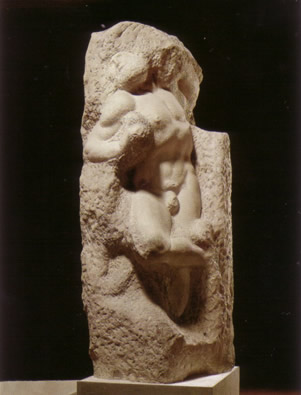Related Topics
Academia (2)
continued.
Favorites - II
More favorites. Under construction.
On Writing History
History doesn't write itself.
Prisoners in the Stone

|
| A Prisoner of the Stone |
The first revolution in book authorship has already taken place. Almost all manuscripts arrive on the publisher's desk as products of a home computer. In fact, many publishers refuse to accept manuscripts in any other form. Not only does this eliminate a significant typing cost to the publisher, but it allows him to experiment with type fonts and book design as part of the decision to agree to publish the book. What's more, anyone who remembers the heaps of paper strewn about a typical editor's office knows what an improvement it can be, just to conquer the trash piles. To switch sides to the author's point of view, composing a book on a home computer has greatly facilitated the constant need for small revisions. An experienced author eventually learns to condense and revise the wording in his mind while he is still working on the first draft. However, even a novice author is now able to pause and select a more precise verb, eliminate repetition, tighten the prose. He can go ahead and type in the sloppy prose and then immediately improve it, word by word. The effect of this is to leave less for the copy editor to do, and to increase the likelihood the book will be accepted by the publisher. The author is more readily able to see how the book looks than he would have been with mere typescript.
It must be confessed, however, that a second revolution caused by the computer has already come -- and gone. Not so long ago, I once linked primary documents already on the Internet to the appropriate commentary within my blog. The idea was to let the reader flip back and forth to the primary sources if he liked, and without interrupting the flow of my supposedly elegant commentary. In those early days of enthusiasm, volunteers were eager to post source material into the ether, just asking for someone to read it eagerly. I had linked up Philadelphia Reflections to nearly a thousand citations when an invincible flaw exposed itself. Historians were eager enough to post source documents, but not so eager to maintain them. One link after another was dropped by its author, producing a broken link for everyone else. The Internet tried to locate something which wasn't there, slowing the postings to a pitiful speed. Reluctantly, I went through my web site, removing broken links and removing most links. Maybe linking was a good idea, but it didn't work. There is thus no choice but to look to institutional repositories for historical storage, and funding to pay for maintaining availability for linkage. It is not feasible to free-load, although only recently it had seemed to be.
This pratfall assumed technology would provide more short-cuts than in fact it would. A more difficult obstacle emerges after some thought given to the nature of writing history because it seems remarkably similar to Michelangelo's description of how to carve a statue. Asked how to carve, he said it was simple. "Just chip away the stone you don't want, and throw it away." Michelangelo saw statues as "prisoners of the stone" from which it was carved, while insights and generalizations of history emerge from a huge mass of unsorted primary documents. But there is a different edge to writing history. Uncomfortably often, the process of writing history is one of disregarding documents which fail to support a certain conclusion, often documents which send inconvenient messages to modern politics. Carried too far, de-selecting disagreeable documents amounts to attempting to destroy alternative viewpoints. By this view of it, what the author chooses to disregard, is then as important as what he chooses to include. Unless awkward linkages are consciously maintained in some form, they will soon enough disappear by themselves. It is a great fallacy to assume that ancient history can be isolated from current politics, or even to believe that history teaches the present. Often, it is just the other way around.
Originally published: Sunday, January 20, 2013; most-recently modified: Monday, July 15, 2019